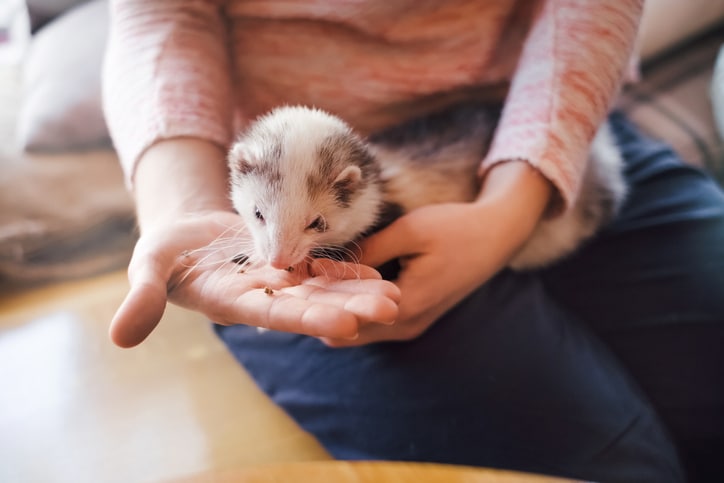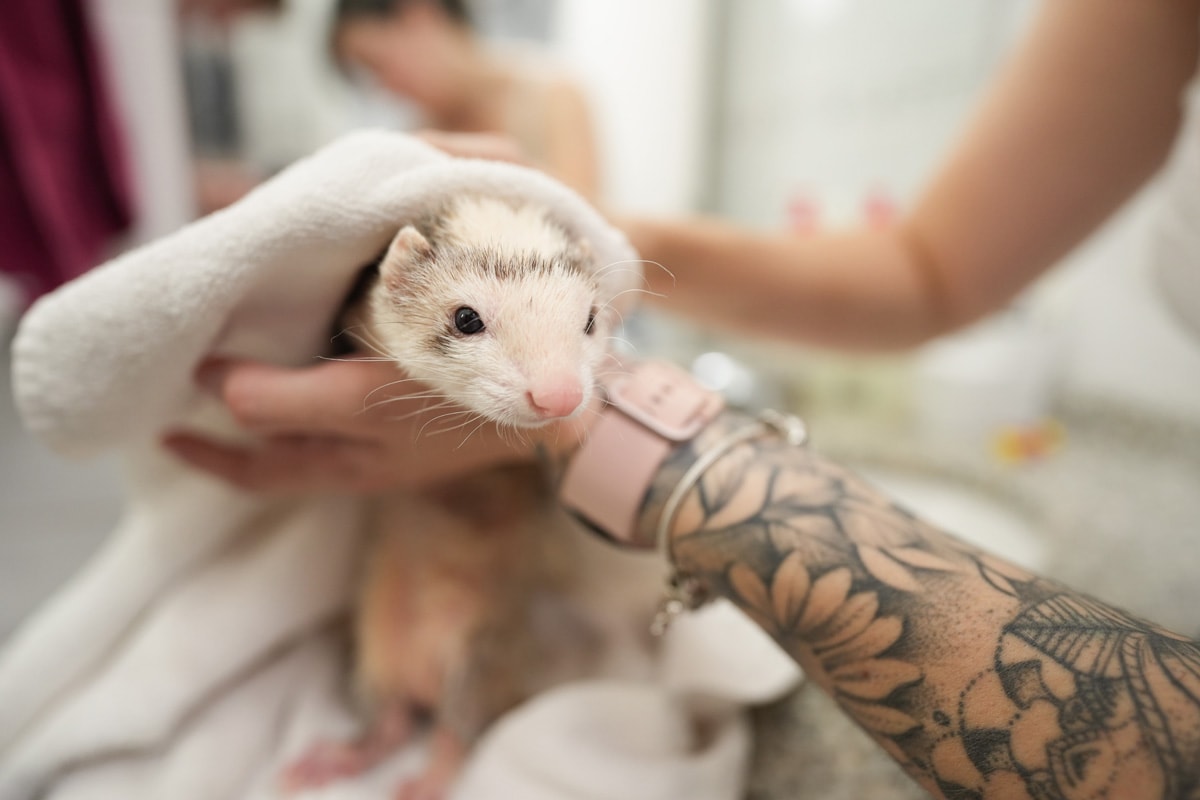What to know
- Ferrets can sometimes carry germs that can make people sick.
- Wash your hands after handling ferrets, their food, or items in their enclosures.
- Provide routine veterinary care for your ferret to keep it healthy and prevent the spread of disease.
- Avoid caring for ferrets while sick, especially with the flu.
- Ferrets are not recommended for homes with children under 5 years old.

Overview
Ferrets have become common household pets in the United States. Although ferrets can make good pets, they can sometimes carry germs that can make people sick. Ferrets are also not recommended for homes with children under 5 years old. Young children have an increased risk of injury from bites.
Diseases
Below is a list of diseases ferrets can spread.
- Campylobacter infection
- Cheyletiellosis
- Giardia infection
- Influenza
- Rabies
- Ringworm
- Salmonella infection
How to stay healthy around ferrets

Before adopting or buying a pet ferret, make sure a ferret is the right type of pet for your family. Ferrets can sometimes spread germs that can make people sick. Young children are also at higher risk for bites from ferrets and should never be left unsupervised around ferrets. Because of this, ferrets might not be suitable pets for certain households.
Ferrets are not legal to own in some areas. Check local laws before adopting a buying a pet ferret.
Wash your hands
Wash your hands with soap and running water after:
- Contact with ferrets
- Contact with ferret saliva or poop
- Handling your ferret's food or supplies
Adults should supervise hand washing for young children. Use hand sanitizer if soap and water are not readily available.
Always use disposable gloves or plastic bags when cleaning up poop from your pet. Be careful to peel off the gloves inside out so you do not touch the outside. Wash your hands thoroughly afterward.
Prevent ferret scratches and bites
Avoid bites and scratches from ferrets. Germs can spread from ferret bites and scratches, even if the wound does not seem deep or serious. Ferret bites can become seriously infected or spread rabies. The risk for rabies increases if the ferret is unvaccinated and has had contact with a rabid animal. Young children are especially at risk for bites from ferrets.
How to prevent ferret bites and scratches
Be cautious with unfamiliar animals. Approach ferrets with care, even if they seem friendly.
Do not play roughly with ferrets, especially when they are young. This will lead to fewer scratches and bites as animals become older.
Always supervise children around ferrets.
What to do if you are bitten or scratched by a ferret
Wash bites and scratches immediately
If you are bitten or scratched by a ferret, you should wash the wound with warm, soapy water immediately.
Seek medical attention if:
- You are unsure if the ferret has been vaccinated against rabies.
- The ferret appears sick or is acting unusual.
- The wound or injury is serious.
- The wound or site of injury becomes red, painful, warm, or swollen.
- It has been more than 5 years since your last tetanus shot.
Some groups have a higher risk for developing infections than others. These groups include children under 5 years old, adults over 65, pregnant women, or people with weakened immune systems.
Serious wounds may be characterized by:
- Uncontrolled bleeding
- Unable to move
- Extreme pain
- Muscle or bone is showing
- A bite is over a joint
Reporting ferret bites
Report bites
Report bites from unfamiliar ferrets to animal control or your local health department.
If possible, contact the owner and ensure the animal has a current rabies vaccination. You will need the following:
- Rabies vaccine license number
- Name of the veterinarian who administered the vaccine
- The owner's name, address, and phone number
Make sure a veterinarian sees the ferret. Contact your local health department if the ferret becomes sick or dies shortly after you were bitten.
How to keep ferrets healthy

Before choosing a ferret
Check your state, local, and property laws before choosing or buying a ferret. Just because you can buy a pet doesn't mean it is legal to own it in your city, state, or property.
Research and learn how to properly care for your ferret before purchase. Ask your veterinarian or pet store staff about the following:
- Food
- Care
- Enclosure or environment that is best for the ferret you are selecting
How to choose a ferret
Pick a ferret that is bright, alert, and active. Consider having a veterinarian examine your new ferret before you finalize the purchase or adoption to ensure it is healthy. Take your new ferret to the veterinarian within a few days to a week after adoption for a health visit.
Ferrets should have a glossy coat free of stool. If any animals in a cage look sick, do not choose a pet from that cage.
If your ferret becomes sick or dies soon after purchase or adoption, take it to the veterinarian promptly. Inform the pet store, breeder, or rescue organization about the pet's illness or death.
How to house your ferret
Because of their curious nature, ferrets are known to escape their cages. House your ferret in a cage that can be securely closed and/or locked. Do not allow your ferret to roam unsupervised.
Keep your ferret out of the kitchen and other areas where food or drink is prepared or consumed. Do not eat or drink while handling your pet.
Make sure your ferret has access to food and fresh water every day.
Monitor your ferret's health

Take your ferret to a veterinarian every year, or if it seems sick. Veterinarians who focus or specialize in small mammals, including ferrets, can provide extra guidance on caring for your pet.
Talk to the veterinarian about rabies vaccination.
Examine your ferret daily, looking for any changes in activity level, appetite, or overall health. Specifically, look for:
- Sluggish or depressed behavior
- Dull hair coat
- Loose stool (poop)
- Discharge from the eyes or nose
- Abnormal breathing
These signs could mean your ferret is sick. If your ferret appears sick or shows these signs, contact your veterinarian immediately.
Tell your doctor about your new pet, if you become sick shortly after purchasing or adopting a ferret.
Ferrets and influenza (flu)
Ferrets can be infected with influenza A and B viruses (human flu), just like people. People can spread flu to ferrets, and it's possible that ferrets may be able to spread flu to people.
Get a yearly flu vaccine
There is no vaccine for flu in ferrets. The best way to protect your pet is to protect yourself from flu.
Avoid contact with your pet while sick
Avoid contact with your pet ferret if you or any members of your household have flu symptoms. Prevent family members with flu from interacting with pet ferrets while sick. Consider having a friend, neighbor, boarding facility, or veterinarian care for your pet ferret while people in your household recovers.
Wear a face mask and gloves to prevent the spread of flu if contact with your pet is unavoidable. Wash your hands before and after interacting with your ferret.
If you have multiple pet ferrets, isolate sick ferrets from the others promptly. Contact your veterinarian immediately to evaluate the health of your ferrets. Discuss how to prevent the spread of flu to your other pet ferrets.
Resources
Selecting and caring for a pet ferret
- Selecting a ferret - American Veterinary Medical Association (AVMA)
- Pet Travel - USDA
- Pet Safety in Emergencies
Staying healthy around ferrets
- 4 Tips to Stay Healthy Around Your Pet
- Adopt these healthy pet habits
- Stay Healthy Around Small Pets
- Administration of Rabies Vaccination State Laws - AVMA
- How to Stay Healthy around Pets
- Terrestrial Rabies and Human Post-Exposure Prophylaxis (podcast)
